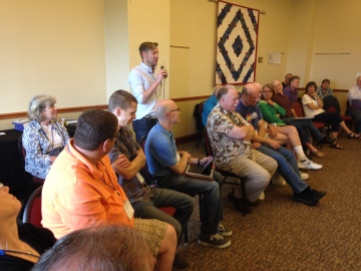Jesus said, “No one can serve two masters; for a slave will either hate the one and love the other, or be devoted to the one and despise the other. You cannot serve God and wealth [‘mammon’].” — Matt. 6:24; par. Luke 16:13
The first Easter morning reveals how different these two masters are. It’s not so much a matter of a logical contradiction of following two masters. Clearly, it’s an existential contradiction due to the fact that these masters are revealed to be polar opposites — such that any normal human being should be disposed to hate one and love the other. The gods of wealth have always been on the side of this world’s most successful people, the “winners.” The God of Jesus the Crucified and Resurrected Messiah reveals true divinity to be beyond taking sides in human affairs by siding with one of this world’s biggest “losers” — a man duly tried and executed as being against the reigning cultural religions.
Mimetic Theory helps to sharpen our understanding of the false masters of our evolution, gods who structure everything in dualisms of us-them, blessed-cursed, winners-losers, wealthy-poor, et. al. Jesus’ self-sacrifice as an executed loser is the only way a nonviolent God has of breaking through all of our false transcendences to reveal the true God as beyond all of the dualisms — revealed precisely through God’s Easter vindication of one deemed as an outsider to our false gods. “Blasphemer!” “Insurrectionist!” No, the Revealer of God as a power of love that can even heal our many us-them divisions.
But such healing must overcome the obstacle of our first evolution. Easter is the pivot-point of a re-evolution. As Paul says, “For just as by the one man’s disobedience the many were made sinners, so by the one man’s obedience the many will be made just” (Rom 5:19). It’s interesting that Paul uses the past and future tenses in the two clauses of this statement. The disobedience is in the past at the point of our origins. Then, it is understood in Paul’s theological context that the “one man’s obedience” has already happened in the cross, revealed as obedience in the resurrection, but the work of making the many just is apparently ongoing and yet to be completed. We live in an era characterized by an overlapping of the original disobedience and the new obedience, each with its own master. We cannot serve both — unless we misrecognize the difference between false and true transcendence, between idols and God.
So as creatures who evolved with the experience of transcendent power, the key to our re-evolution is conversion in obedience to the true master. Which god commands our obedience? The gods of our evolution who divide the world between winners and losers? Or the God who graciously offers re-evolution through the obedience of Jesus the Loser Messiah — the one who seeks to heal those divisions by constantly identifying with this world’s losers (such as the hungry, thirsty, sick, naked, imprisoned, and immigrant of Matt 25:31-46)?
The title of this blog suggests that our modern North American form of trying to serve two masters involves elevating the “free market” to a status of false transcendence. Let me be clear: The way that markets operate in our economics is a power transcendent to our realm as “interdividuals” (Girard’s neologism for “individuals”). Markets are mechanisms with power higher than any one person. But their transcendence only remains truly perceived when they are given a wholly anthropological grounding in a realm of transcendence created by human interaction. The problem comes when the “free market” is given an interpretation that goes beyond the anthropological, when it is viewed as some force of nature with a power governing human relations, rather than as a power wholly grounded in human relations. It is like Jesus said of the sabbath, “The sabbath was made for humankind, and not humankind for the sabbath; so the Son of Man is lord even of the sabbath” (Mark 2:27-28). Similarly, markets are made to be governed by humankind, not humankind by the markets.1
But our current iteration of capitalism — especially in the conservative Republican version of it, since the advent of “Reaganomics” — seems to place governance and markets in opposition. Governments need to get out of the way of markets, according to this economic philosophy, and let them ‘freely’ operate. I propose that this is an approach to economics which crosses the boundary into a false transcendence, letting markets supposedly rule us instead of the other way around. And the deeper truth behind this “Reaganomics” is that it is a ruse to let those who have the wealth make the rules behind the scenes, such that markets work in their favor. Markets are never “free” in the sense of being completely unbound by any human rules to simply work as a force of nature akin to the naturals laws put into place by the true Creator. The creator of markets are human beings, and it will always be human rules that dictates their workings. So if government ‘gets out of the way’ of setting the rules, then some other governing body of human beings are the ones ‘free’ to set the rules. In our current form of “Reaganomics,” that governing body becomes by default those who already hold the most economic power . . . the wealthiest oligarchs. Should this trend continue, the United States will further descend from its democratic ideals into an oligarchic reality.
 I have used quotes around the phrase “free markets” following the convention of Robert Reich in his “big-league” important book Saving Capitalism: For the Many, Not the Few. I highly recommend this book as a guide for learning effective articulations critical of Reaganomics. His basic point is consonant with what I’m saying in terms of false transcendence — and so he is seeking a ‘redeemed’ capitalism properly governed by the many, instead of a version that is falsely transcendent in order to cover for the kleptocracy of the wealthiest. Markets are never free. ‘Markets are made for humankind, and not humankind for markets.’
I have used quotes around the phrase “free markets” following the convention of Robert Reich in his “big-league” important book Saving Capitalism: For the Many, Not the Few. I highly recommend this book as a guide for learning effective articulations critical of Reaganomics. His basic point is consonant with what I’m saying in terms of false transcendence — and so he is seeking a ‘redeemed’ capitalism properly governed by the many, instead of a version that is falsely transcendent in order to cover for the kleptocracy of the wealthiest. Markets are never free. ‘Markets are made for humankind, and not humankind for markets.’
Reich writes contra to the “prevailing view” that pits “free market” against government,
But the prevailing view, as well as the debate it has spawned, is utterly false. There can be no “free market” without government. The “free market” does not exist in the wilds beyond the reach of civilization. Competition in the wild is a contest for survival in which the largest and strongest typically win. Civilization, by contrast, is defined by rules; rules create markets, and governments generate the rules….
A market — any market — requires that government make and enforce the rules of the game. In most modern democracies, such rules emanate from legislatures, administrative agencies, and courts. Government doesn’t “intrude” on the “free market.” It creates the market.
The rules are neither neutral nor universal, and they are not permanent. Different societies at different times have adopted different versions. The rules partly mirror a society’s evolving norms and values but also reflect who in society has the most power to make or influence them. Yet the interminable debate over whether the “free market” is better than “government” makes it impossible for us to examine who exercises this power, how they benefit from doing so, and whether such rules need to be altered so that more people benefit from them. (pp. 4-5)
Mimetic Theory offers us a lens to the sacred violence in our current economics: human beings move-in to manipulate people through the false transcendence, in this case leading the majority to believe in a myth of “free markets.” Reich, who as far as I know is not aware of Mimetic Theory, nevertheless describes the process well:
The “free market” is a myth that prevents us from examining these rule changes and asking whom they serve. The myth is therefore highly useful to those who do not wish such an examination to be undertaken. It is no accident that those with disproportionate influence over these rules, who are the largest beneficiaries of how the rules have been designed and adapted, are also among the most vehement supporters of the “free market” and the most ardent advocates of the relative superiority of the market over government. But the debate itself also serves their goal of distracting the public from the underlying realities of how the rules are generated and changed, their own power over this process, and the extent to which they gain from the results. In other words, not only do these “free market” advocates want the public to agree with them about the superiority of the market but also about the central importance of this interminable debate. (pp. 6-7)
 I would like to conclude with another book recommendation, one that brings us back where we began, with the opposition of Easter faith with “free market” faith. Brazilian liberation theologian Jung Mo Sung is a reader of Mimetic Theory who, in his book Desire, Market, and Religion, applies some of its insights to a theological evaluation of market economics. He begins by elaborating just how much current versions of capitalism operate akin to a religious faith, with principles and doctrines that require faith not unlike religious doctrines.
I would like to conclude with another book recommendation, one that brings us back where we began, with the opposition of Easter faith with “free market” faith. Brazilian liberation theologian Jung Mo Sung is a reader of Mimetic Theory who, in his book Desire, Market, and Religion, applies some of its insights to a theological evaluation of market economics. He begins by elaborating just how much current versions of capitalism operate akin to a religious faith, with principles and doctrines that require faith not unlike religious doctrines.
A brief example in line with what we have talked about here would be the way in which recent proponents of capitalism present the “free market” with “market laws” akin to natural laws governed by forces outside human control. In commenting on F. Fukuyama’s faith in finite human beings to embark on unbounded progress, Sung writes,
Fukuyama, like many other liberal and neoliberal thinkers, credits this magic capacity to technology; not any technology, but technology that was developed “in accordance with certain defined rules [that were] laid down not by man, but by nature and nature’s laws.” And what is this nature that is able to generate such a powerful science? It is the same nature that, according to Fukuyama, moved the evolution of history in the direction of the market system. Likewise Paul A. Samuelson, winner of the Nobel Prize in Economics, says that the capitalist market system “merely evolved, and, as in the case of nature, is undergoing changes.” (p. 14)
We see that markets created and governed by human beings are viewed instead as created and governed by transcendent powers beyond humankind. In light of Mimetic Theory, this is the familiar story of sacred violence justified by “orders of creation.” “Free market” capitalism thus operates in ways similar to the sacred violence behind other isms, like racism and sexism. Inequality is portrayed as something created beyond human control in a state of nature:
- Men are ‘naturally’ superior to women and should rule over them.
- White people are superior to People of Color and should rule over them.
- Wealthy people are selected by the “free market” to succeed, and poor people are ‘necessary sacrifices’ to the good order of market capitalism.
It is no coincidence that all the isms are intersectional in their oppression. All of it is grounded in faith that the world is ruled by gods who select winners and losers.
And so I give the last word to Sung, who poses the Easter faith contra to faith in the “free market”:
The Christian faith is not grounded in this conception of a God who is always on the side of the righteous winner. On the contrary, it is grounded in the confession that Jesus of Nazareth is risen. That is the centre of our faith. To confess that Jesus — defeated, condemned and killed by the Roman Empire and the Temple — is risen is to believe in a God who is not partnering with the winner (the Empire and the Temple). This faith allows the distinction between victory and the power of truth and justice. (p. 24)
Notes
1. For a similar move writing on economics from Luke 16:13, on serving two masters, to Mark 2:27, the sabbath serving humankind, see Brian McLaren, Everything Must Change, pp. 240-41.
























































